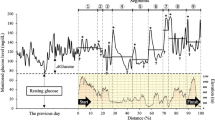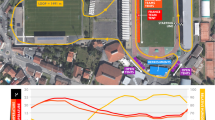Abstract
In order to study nutrient intake of amateur runners during a mountain marathon, compliance with recommendations, and association with performance, an intake of 42 participants in a Swiss mountain marathon was assessed by direct observation. Data on demographics, dietary preparation and race experience were obtained by questionnaires. Anthropometrical measures were performed before and after the race. Mean hourly intakes (SD) of fluid, carbohydrate, energy and sodium were 545 (158) ml, 31 (14) g, 141 (63) kcal [or 590 (264) kJ], and 150 (203) mg respectively. A third of the runners drank 600 ml h−1 or more, 52% consumed less than 30 g h−1 carbohydrates, 95% consumed less than 500 mg h−1 sodium. Mean weight loss was 4 (1.5) kg; 30 runners (71%) lost over 3% body mass. Mean running time was 7 h 3 min (1 h 17 min). Most participants failed to meet nutritional recommendations. None were at risk of overhydration. Body composition and race experience were correlated with performance, but not nutrient intake. Because experienced runners are well trained, fitter, and know better their personal needs during such a race, it is difficult to disentangle these associations. As causal relationship cannot be proven with this cross-sectional design, non-compliance with intake recommendations requires additional experimental research on the impact of nutrient intake on field performance.

Similar content being viewed by others
Notes
a Swiss refreshment beverage, based on the constituents of milk serum; 100 ml contains 84 kJ, <0.1 g protein, 5 g carbohydrate, <0.1 g fat, 9 mg vitamin C and 0.21 mg vitamin B1
References
American College of Sports Medicine, American Dietetic Association, and Dietitians of Canada (2000) Med Sci Sports Exerc 32:2130–2145
Applegate EA (1991) Nutritional considerations for ultraendurance performance. Int J Sport Nutr 1:118–126
Barr SI, Costill DL, Fink WJ (1991) Fluid replacement during prolonged exercise: effects of water, saline, or no fluid. Med Sci Sports Exerc 23:811–817
Bergstrom J, Hermansen L, Hultman E, Saltin B (1967) Diet, muscle glycogen and physical performance. Acta Physiol Scand 71:140–150
Burke L M (2001) Nutritional needs for exercise in the heat. Comp Biochem Physiol A 128:735–748
Casa D J (2004) Proper hydration for distance running: identifying individual fluid needs. Track Coach 167:5321–5328
Cian C, Barraud P A, Melin B, Raphel C (2001) Effects of fluid ingestion on cognitive function after heat stress or exercise-induced dehydration. Int J Psychophysiol 42:243–251
Durnin J V, Womersley J (1974) Body fat assessed from total body density and its estimation from skinfold thickness: measurements on 481 men and women aged from 16 to 72 years. Br J Nutr 32:77–97
Edwards J E, Lindeman A K, Mikesky A E, Stager J M (1993) Energy balance in highly trained female endurance runners. Med Sci Sports Exerc 25:1398–1404
Fallon K E, Broad E, Thompson M W, Reull P A (1998) Nutritional and fluid intake in a 100-km ultramarathon. Int J Sport Nutr 8:24–35
Hawley J A, Dennis S C, Noakes T D (1992) Oxidation of carbohydrate ingested during prolonged endurance exercise. Sports Med 14:27–42
Hew T D, Chorley J N, Cianca J C, Divine J G (2003) The incidence, risk factors, and clinical manifestations of hyponatremia in marathon runners. Clin J Sport Med 13:41–47
Hickner R C, Fisher J S, Hansen P A, Racette S B, Mier C M, Turner M J, Holloszy J O (1997) Muscle glycogen accumulation after endurance exercise in trained and untrained individuals. J Appl Physiol 83:897–903
Kimber N E, Ross J J, Mason S L, Speedy D B (2002) Energy balance during an ironman triathlon in male and female triathletes. Int J Sport Nutr Exerc Metab 12:47–62
Maughan R J (1991) Fluid and electrolyte loss and replacement in exercise. J Sports Sci 117–142
Minetti A E, Moia C, Roi G S, Susta D, Ferretti G (2002) Energy cost of walking and running at extreme uphill and downhill slopes. J Appl Physiol 93:1039–1046
Noakes T D (2002) IMMDA AIMS advisory statement on guidelines for fluid replacement during marathon running. New Stud Athlet 17:15–24
Noakes T D (2003) Overconsumption of fluids by athletes. BMJ 327:113–114
O’Brien M J, Viguie C A, Mazzeo R S, Brooks G A (1993) Carbohydrate dependence during marathon running. Med Sci Sports Exerc 25:1009–1017
Rehrer N J (2001) Fluid and electrolyte balance in ultra-endurance sport. Sports Med 31:701–715
Rehrer N J, Brouns F, Beckers E J, Frey W O, Villiger B, Riddoch C J, Menheere P P, Saris W H (1992) Physiological changes and gastro-intestinal symptoms as a result of ultra-endurance running. Eur J Appl Physiol 64:1–8
Speedy D B, Noakes T D, Rogers I R, Thompson J M, Campbell R G, Kuttner J A, Boswell D R, Wright S, Hamlin M (1999) Hyponatremia in ultradistance triathletes. Med Sci Sports Exerc 31:809–815
Speedy D B, Noakes T D, Kimber N E, Rogers I R, Thompson J M, Boswell D R, Ross J J, Campbell R G, Gallagher P G, Kuttner J A (2001) Fluid balance during and after an ironman triathlon. Clin J Sport Med 11:44–50
Titchenal C A (1988) Exercise and food intake. What is the relationship? Sports Med 6:135–145
Vrijens D M, Rehrer N J (1999) Sodium-free fluid ingestion decreases plasma sodium during exercise in the heat. J Appl Physiol 86:1847–1851
Acknowledgements
The authors are indebted to J. Décombaz for the original idea and his input for the set-up of the study, and to P. Sudre for his contribution to the manuscript editing.
Author information
Authors and Affiliations
Corresponding author
Rights and permissions
About this article
Cite this article
Kruseman, M., Bucher, S., Bovard, M. et al. Nutrient intake and performance during a mountain marathon: an observational study. Eur J Appl Physiol 94, 151–157 (2005). https://doi.org/10.1007/s00421-004-1234-y
Accepted:
Published:
Issue Date:
DOI: https://doi.org/10.1007/s00421-004-1234-y




